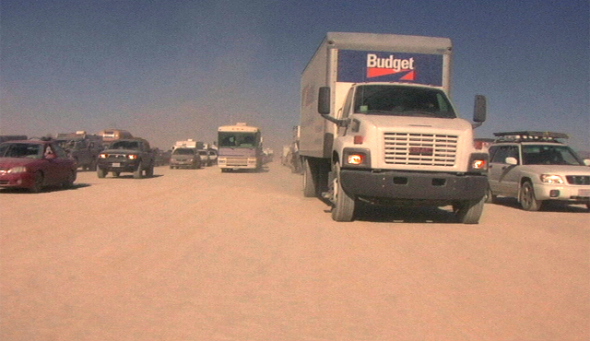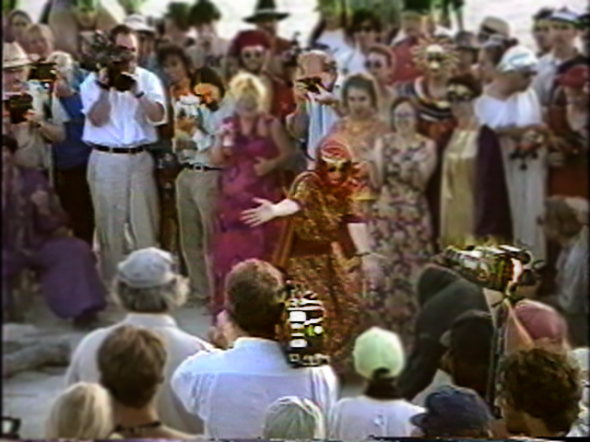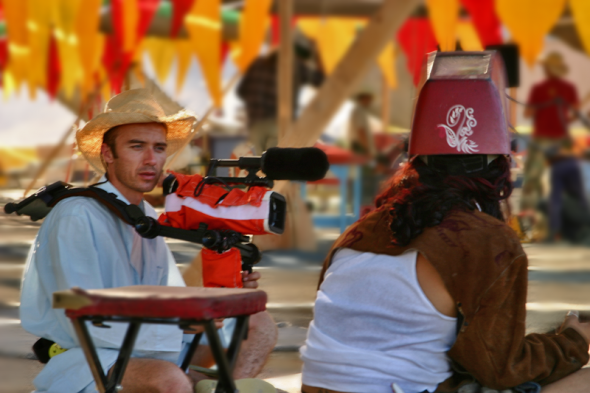Just a quick note here. Burning Man Media team is opening up a dialogue about digital rights and has invited people from within the community to expose their views about photography at the event.
A few weeks ago, they sent me a prompt to react to. And here’s my take they posted on their blog:
http://blog.burningman.com/digital-rights/photography-can-also-be-art/
[Olivier Bonin, filmmaker, responds to a prompt from excerpts from Susan Sontag’s seminal essay, On Photography (1977) and from the Burning Man website, to reflect on documentation on the playa. This post is part of the Digital Rights Blog Series.]
Susan Sontag
Background
Susan Sontag, American author, artist and literary theorist, lived from January 16, 1933 – December 28, 2004, but her work lives on in art schools around the world. In 1977, Sontag wrote the essay On Photography, which continues to provide media students and scholars an entirely different perspective of the camera in the modern world.
Our Prompt
We sent Olivier the following prompt to respond to:
“Review these excerpts from On Photography by Susan Sontag (1977):
1. To collect photographs is to collect the world.
2. Photographs furnish evidence.
3. That age when taking photographs required a cumbersome and expensive contraption — the toy of the clever, the wealthy, and the obsessed — seems remote indeed from the era of sleek pocket cameras that invite anyone to take pictures.
Review this excerpt from Burning Man’s Ten Principles:
‘Our community seeks to create social environments that are unmediated by commercial sponsorships, transactions, or advertising. We stand ready to protect our culture from such exploitation. We resist the substitution of consumption for participatory experience.’ Burning Man Website (2010)”
Olivier’s Response:
Yes, there might be a problem on how we try to document every single thing we see, but that problem is sourced in the way we consume, in the way we are as a society: it is entrenched into our contemporary culture. To change the way we photograph, is to change the way we live almost. It’s all inter-connected… a giant neurosis, that we need to work on all together. And of course I think Burning Man is part of the solution if it demonstrates a bigger interest in the method of doing art together…
On Consumerism
Burning Man prides itself not to participate in consumerism, but to go to Burning Man is to consume. Each person that goes to Burning Man has to spend a lot to be self-reliant for one week in the desert. To create a city in the desert, is to transport everything to this environment. To truly reflect on our consumerist society would require minimizing our exposure to it, but that’s not what a deserted dry lakebed calls for.

Budget Truck in Line for Burning Man, ©2007 Dust & Illusions
I would even go further, and say that escaping consumerism was never was part of the original intentions. The need to escape the traps of our larger society was definitely there, but I believe the original intentions of the Burning Man project were to create a temporary site to simply relieve us from the constant attack on our senses of the mainstream cultural Act. It was a place to create our own reality, and express ourselves freely in the rawest manner possible without the need for it to be judged worthy of any value by our society’s standards. It was only later than Burning Man started to be associated with an anti-consumerist alternative, but the resistance to consumption has ever only been expressed through the lack of commercial sponsorship, transaction or advertising, and not necessarily through deeply dealing with the consumption that occurs pre-event.
In the depth of the event, you can of course find a real call from its participants to recreate a world where community is more important than capitalism. There are many examples in the artists’ group, and the theme camps, but these examples need to become the driving principles behind the event in order to effectively alter the consumerist reality. Where Burning Man really thrives is in offering an open stage for anyone’s artistic expression. And that is the single reason why Burning Man is still an important event today. The event has produced important artistic content, and truly inspires people to create! Let’s focus on this aspect to create a community with strong and deep artistic values, and the rest will follow.

Cameras at an Impromptu Show (©1993 Peter Goin)
On Photography
With 50,000 participants at Burning Man, there are at least 25,000 cameras on site, documenting each micro-event dozens and maybe even hundreds of times. Photography is embedded into our lives just like eating. We can not fully express ourselves, and do not feel complete without the documentation of our every moments. We consume photography even more than we consume water. Our fast-paced, highly consumerist world reflects the way we takes pictures, thousands of pictures. We click, click and click, to create a massive database of visuals that we end up browsing through without ever taking the time to reflect on the meaning of our experience there.
We often bring photography into a situation without any care for what we’re trying to photograph, since most pictures are simple snapshots. When “taking photographs required a cumbersome and expensive contraption”, we might have been more thoughtful about what we were capturing, and might have always tried to bring real cultural value into each photograph. This is not the case with “sleek pocket cameras” (in Sontag’s words).
The real value in cheap and “sleek pocket cameras” might be that more people with deeper intentions have access to them, enabling for a small subset of higher quality output in the midst of so much noise.
And so there’s no way to escape photography, nor to control it. Those who will engage in photography in manners that the community of Burning Man doesn’t approve, will always find a way to do so. We should accept all cameras even if we don’t like them. This phenomenon is new, and the community will have to learn the best way to keep some spaces and moments sacred away from the cameras. The current set of rules established by the Burning Man organization hasn’t prevented excesses from happening.
I have been to the desert on six different occasions, and have been filming on every single one of them. I have always been very aware of my position as a photographer/filmmaker. My presence can directly interfere with other people’s experience there, either preventing that experience to happen, so preventing me from capturing it, or more often altering the truth of a situation (in the end, preventing me from capturing what is really happening when the camera isn’t there). I have continued filming, and created my own way to immerse myself into the event, and film a less altered reality. I decided to connect truly with the culture, and fully participate with my camera to become an integral part of the experience, instead of being simply an observer of it.

Olivier Bonin Filming Rosanna Scimeca, ©2004 Dust & Illusions
That’s how I came to join the Flaming Lotus Girls (FLG). I first chose to document the FLG because of their ethos. They create art for Burning Man, but their main goal is to teach the art of metal and fire with a focus on women, and create a strong group of artists that can then go do the same. That inspiring model inspired me to go look much deeper into the Burning Man experience and history. I became an integral part of the group as their documentarian, producing short film pieces to help them promote their work or present it for education purposes to institutions like Stanford. With such an integration, it created a situation where I the filmmaker wasn’t a voyeur but rather a full participant. I belonged to the group, who in return gave me full access. I was able to film without disturbing, and I wasn’t just taking since I was producing a lot of videos for them. It became a very fruitful relationship, which allowed me to understand what was happening at Burning Man in its deeper strata. And I worked with another half dozen groups with which I have shared all my footage. Filming the Burning Man experience in this way was enlightening for me and non-intrusive for the subjects.
I would hope that Burning Man would start considering photographers and filmmakers as part of their community by modifying certain aspect of their approach:
1. The contract between Burning Man and photographers and filmmakers should simply state what is not allowed to be filmed, and what context such footage should never be used in. This would prevent abuse from both sides, and open up a real freedom of speech.
For issues of privacy, photographers and filmmakers should always have to ask first, and that should be clearly stated in the contract. For such content, the Burning Man organization could have a “veto” if the content is not used in a respectful grander context.
2. Considered like artists: All artists at Burning Man are allowed to sell their artwork, and this is true for granted artists by contract!
Photographers and filmmakers should be given full freedom to sell their work. Even the most successful will certainly never be able to cover the costs they have engaged to produce the artwork. And if one were to be successful, then we should celebrate her/him rather than engage into pitiful battles of who the money should go to. This would be an economy we should embrace as a community, since all it does is support an artist, so she/he can continue what she/he’s doing, and potentially provide food for thought for the community.
Black Rock LLC makes it harder for photographers to sell their work, when they support all sorts of businesses (see: Jack Rabbit Speaks Resources Edition) without taxing them (most commercial use of photography is taxed by 10%), some of them who are far from engaging in sustainable practices. But the reason the LLC allows this is “Burning Man is NOT anti-commerce. We’re against commodification, which is quite a different thing. We recognize that commerce makes the world go around, and we believe in the creativity and drive of small business owners. Those are the folks we seek to support here, in the face of mass market consumerism. (JRS: Volume 14, Issue #18, June 18, 2010)”. So why can’t photographers do the same, they are also part of the small-scale economy, the ART economy at that!!
3. Since commercial sponsorships is forbidden, preventing any business or corporation to use the Burning Man event to sell or promote their product, corporate media should never be given access to the event as well. Black Rock LLC said that this is a great way to spread the word about BM, but isn’t that simply engaging with corporate media, that are being paid by the very commerce the 10 principles try to keep out of BM. These medias are engaging in commodification of our values, and are banking on the popularity of the subject to get us to watch commercial advertising. And as independent photographers we still have to go through considerable hoops to sell our work. No corporate TV stations, or internet media outlet, or commercial papers should be allowed on the ground. If members of these organizations wanted to film there, they could do so with financial, editorial and logistical independence from them. This could prevent from the superficial news style content that comes from these organizations and that usually doesn’t help our community to progress. That content is too often simplistically consumed rather than used to bring dialogue and progress. There’s enough simple content produced by everyone else with their pocket cameras.
On the other hand, thoughtfully produced content by photographers who come from the community could be sold at the photographers discretion to those commercial outlet, allowing a more thoughtful portraying of the event to come out in those bigger media outlets.
4. If limiting the number of camera crews at Burning Man is needed, then only the crews who are already seriously integrated within some artists groups, theme camps they plan to document should be allowed, since this would voucher to their level of seriousness.
[Born in France and educated with an engineering degree in microelectronics, Olivier Bonin showed an early interest in photography and film. He studied photography in San Francisco, where he found his way into filmmaking. Starting with short fictions, he quickly found a perfect symbiosis between his interest and knowledge in social movements and filmmaking in the documentary form. Attending Burning Man, he knew he had found a great subject combining film photography in such a beautiful environment, and a complicated human story of community building.]
Leave a Reply